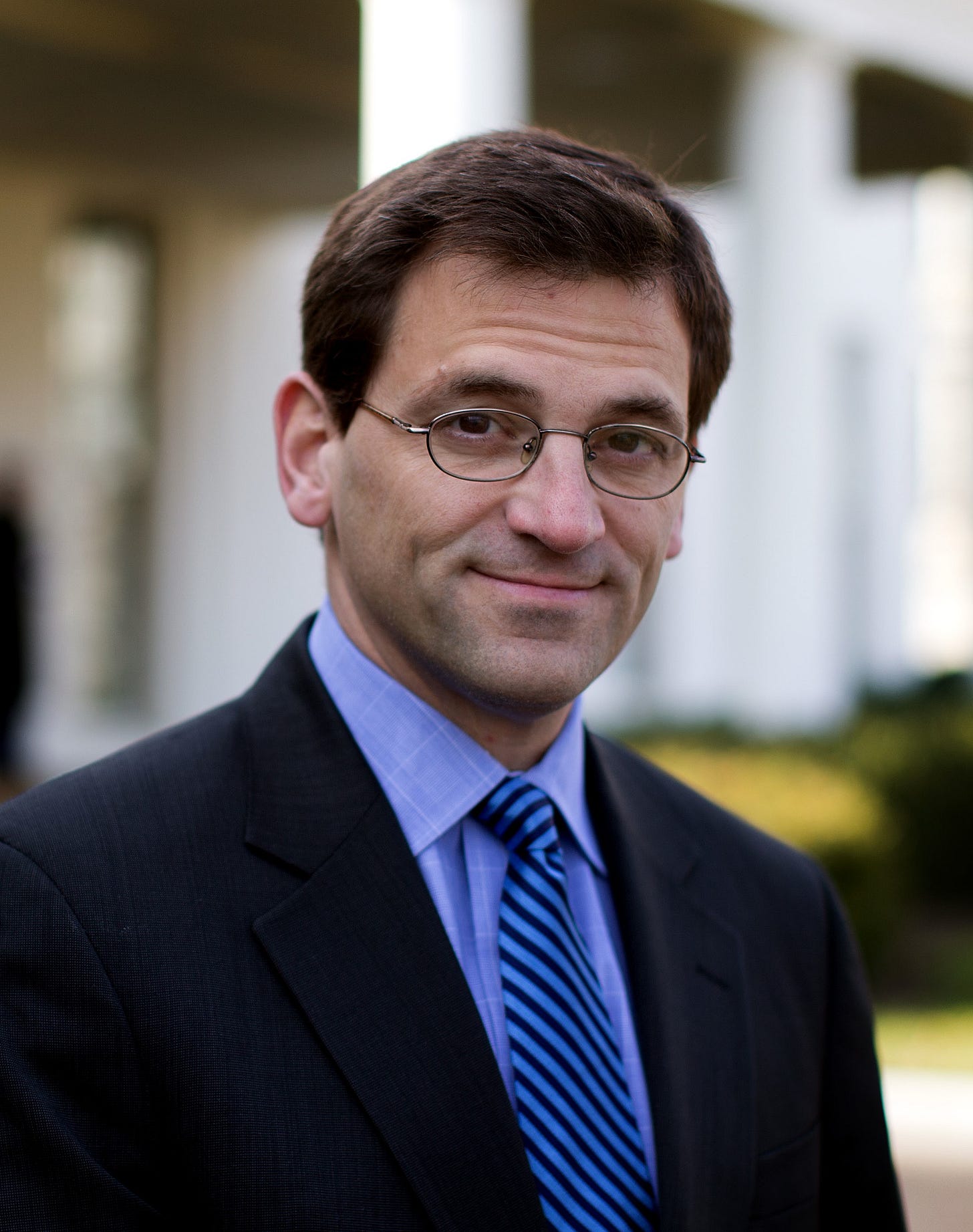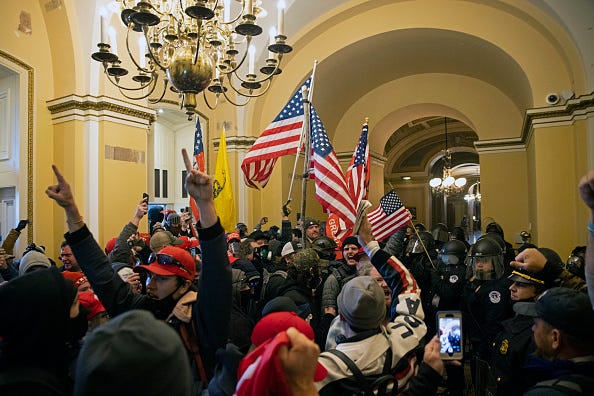Lucid Interview: Peter Baker
"January 6 was both unimaginable and 100% foreseeable"
I’m pleased to present this interview with Peter Baker, chief White House correspondent for The New York Times and a political analyst for MSNBC. He has covered five presidents and currently writes about Joe Biden and his administration. While at The Washington Post, he served as Moscow co-bureau chief, chronicling the rise of Vladimir Putin. He is the author or co-author of six books, including the 2020 NYT bestseller The Man Who Ran Washington: The Life and Times of James A. Baker III, written with his wife, Susan Glasser of The New Yorker. This interview, conducted March 29, has been edited for flow and clarity.
Ruth Ben-Ghiat (RBG): You have thought about the GOP for a long time. I’m curious to get your take on how Donald Trump, who came to the presidency from outside of politics, was able to turn the GOP into his personal tool.
Peter Baker (PB): Trump was the first “Independent” we’ve had as president. Theodore Roosevelt tried it in 1912, Ross Perot and others tried it more recently, but all who tried to break out of the two-party system failed. Trump simply went into one of the existing parties and hijacked it. Jared Kushner used that same phrase in an interview with me -- he referred to it as a hostile takeover of the Republican Party. I got a lot of grief for that story because people misinterpreted my description to suggest that being an Independent meant being a moderate. And that’s not the case. In fact, most Independents running for president are not moderates, they are either really left wing like Ralph Nader or really right wing like Pat Buchanan.
By Independent, I meant that he wasn’t a creature of the system. Trump had been a member of every party out there, flipping back and forth six or seven times in his lifetime, including the Reform Party. Trump adapted himself to what he thought could be successful in the Republican Party and then he converted the party to his image. You would have thought there would be a reckoning within the party after Jan. 6, but he remains remarkably popular among Republicans.
RBG: How do you see the Jan. 6 assault on the Capitol?
PB: Well, it’s such a seismic event that I think we haven’t yet gotten our heads around it. It feels like everything changed that day and you would have thought it would have shaken things up more than it has. It was both unimaginable and 100% foreseeable. If you watched what was happening over the previous four years it was completely foreseeable that you’d have a president that would refuse to accept any result from the election other than a victory for him. Some of his most virulent critics could not have imagined it would result in violence against the Capitol, but given Trump’s flirtation with conspiracy theorists and extremist groups over the years it was certainly a very plausible result. It did shock us but it’s amazing how quickly people returned to their tribal places. It’s hard to shake people out of those places right now.
RBG: Yes, but I feel we're in a very dynamic situation politically.
PB: It is a very dynamic situation and so I think we should be careful about making predictions. Two years to the next midterm elections and four years to the presidential election is a lifetime. One thing we have learned is not to assume that it will play out the way we think it will. History is somewhat of a guide, but a lot of things that were unthinkable four years ago turned out to be thinkable.
RBG: You wrote a book on Russian President Vladimir Putin and reported on former Iraq President Saddam Hussein. Do you see Trump as a wannabe authoritarian?
PB: We can go too far, but Trump does have autocratic instincts. Trump’s entire experience in business was in a family company without shareholders or a board of directors. No countervailing power influenced his business other than creditors and people who gave him money. Plus, he had no experience in politics or the military before coming to office, no experience with anything that has a larger mission that goes beyond your own personal wealth, brand and family.
So, at age 70 he comes into the presidency and expects to snap his fingers and make things happen. Now, a lot of presidents come in and are surprised at the constraints. They think the presidency is more powerful than it actually is. It’s partly a media creation, since it’s easier to focus on one person than 535 [members of Congress] in a co-equal branch of government, or nine in the Supreme Court [whose proceedings] don’t appear on television.
But Trump in particular had this idea that he should be able to direct things. I would hear him talk about autocratic leaders like [Chinese Premier] Xi Jinping with envy, about how they were able to get things done without some picayune agency requiring this public posting or that regulatory process, and of course without Congress or the courts. He would talk about how the Chinese could put someone on trial, get a verdict and execute the punishment right away, without all of this process and appeals.
Trump clearly finds something about this appealing. And that is what makes him appealing to many people, because he’s decisive and wants to get things done. But it was really striking how little respect he seemed to have for the idea for balance of power, separations of power or limitations on his power.
RBG: Some people were critical of how the media covered Trump. They looked to the media to be a savior or a warrior for democracy, and they were disappointed.
PB: This was always a challenge for us in the media. Because we provided scrutiny of President Trump, a number of our readers assumed that we were somehow part of the resistance. But there’s a difference. We’re not part of the resistance -- it’s not our job to be the resistance and people shouldn’t want us to be. I don’t think that’s a healthy role. There are plenty of people out there to be the resistance.
Of course, there are different roles within the media, there are pundits and columnists, etc. But for beat reporters like me and others, it’s our job to provide as many facts as possible and to put them in context. Trump wanted us to be seen as the opposition, and that served him to discredit us: “don't listen to them, they are just the opposition.” Instead of us being an independent institution in society that can be trusted by people of all ideological points of view. And I think that’s the danger for us.
RBG: So, how did it feel covering somebody who labeled the press as the enemy of the people?
PB: Every president I have covered has a fraught relationship with the press. Our job as reporters is to tell stories the president might not want to tell. Other presidents complained about us and even took action against us, as when [former President Barack] Obama launched all those leak investigations. But there is something drastically different to have a president call us enemies of the people, fake news, with such repetitiveness. It wasn’t just saying, “I don't like this particular news organization” or “I don't like this story.” It was saying that the very concept of the free press shouldn’t be trusted, and it undermined the idea that the press can provide information that’s different from his. And that’s dangerous.
RBG: How do you stay serene and keep perspective, given the always-on life of a journalist?
PB: I love my job and I started covering the White House in 1996. I still get energized by this job, but yes, the last four years were exhausting because it was unending and stressful. There was a more direct attack on press than by other presidents and you never knew where that would lead. But I think this also reminded us of why the press matters and why it is important for us to do our job. It reminded us that we do play an important role in society that goes beyond government and goes beyond other institutions. If we don’t exist, if we don’t do our jobs and tell people what’s going on, there’s a huge consequence to that.




When Peter Baker said “and that is what makes him appealing to many people, because he’s decisive and wants to get things done.” ...my toes curl. I’ve heard interviews with PB where he prides himself to be objective, but he’s not 100%. What frustrates me is he overcompensates. He often prefaces his analysis with “we can go to far” and “we have to be careful”... What? He can’t say Trump IS AN autocrat (it’s not instincts), that Trump lies and his ideology is “self”? That’s like saying we have to be careful when we (journalists) say climate change is real and racism is a driving force in our society. I had a colleague once when I worked in higher education who always backed out of conversations that were uncomfortable and strongly weighted. She was Catholic and another colleague would clap back and call her “Our Lady of Perpetual Denial”. As a respected and known journalist I wish Peter would shed what he sees as “caution” skin and call out the obvious. I’m not a journalist but know to achieve excellence much training goes into becoming a strong voice in reporting. But, we KNEW Barr egregiously and likely broke laws in covering for Trump. We knew Trump colluded and conspired with Russia and we’ll find out one day he was the puppet master for January 6th. We knew his cabinet, each and everyone was there for self and diminished those departments with their power. So, I don’t think journalists need to be careful about describing what would be in an alternative history if Trump’s insurrection had succeeded.
I have a similar reaction at Baker's anodyne way of characterizing Trump with such carefulness. This was the road to normalizing hateful aberrant presidential behavior, while being aware of it. Saying Trump had a "flirtation" with conspiracy theorists grossly distorts and minimizes in an absurd way his hateful conspirational mindset from birth certificates to the caravan and beyond-- and his superspreader tweets. Talking about his experience as limited to being CEO of a family business, avoids his predatory practices, as well as ignoring his personal behavior. As if becoming president, he earned the benefit of the doubt, and a relative forgetting of his offensive, racist past and present in business and politics.